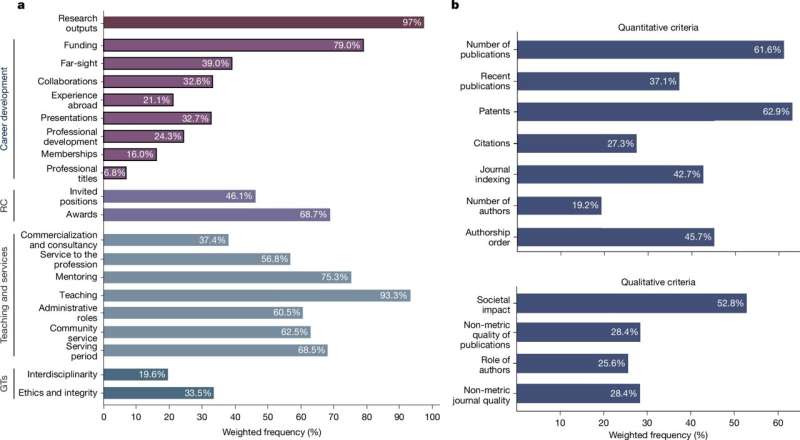January 23, 2025 report
This article has been reviewed according to Science X's editorial process and policies. Editors have highlighted the following attributes while ensuring the content's credibility:
fact-checked
peer-reviewed publication
trusted source
proofread
Criteria for promotion to full professorship found to vary greatly around the world

A large international team of researchers with varied backgrounds has found that moving up in a research field in an organization, whether in the government or academic world, requires vastly different accomplishments by those on a career path.
In their paper published in the journal Nature, the group describes how they studied the factors that are looked at by those in a position to approve the advancement of researchers below them and found them to vary widely by country and region.
To learn more about the factors that lead to advancement in research settings, the team analyzed hundreds of policy documents collected over the years 2016 to 2023 from 190 academic institutions and 58 government agencies around the world that contained information regarding promotion criteria. In all, the documents they studied covered 121 countries or regions that had been published in 27 languages.
The researchers found that approximately 97% of the documents they studied cited research output as a major factor in promotion. They also found that approximately 92% of the documents outlined quantitative metrics that needed to be established for promotion, such as number of papers published, patents obtained or citations of candidates by others.
They also noted that some institutions gave credit for qualitative metrics such as the perceived quality of the journal where a paper was published or its impact on society—they noted that some even gave weight to where a candidate appeared on a list of authors for a given paper.
The researchers also noted that there were regional differences regarding qualifications. For example, institutions in Asia tended to prioritize outcomes and impacts of research rather than visibility or experience. In other countries, such as the United States, publication record took primacy in promotions, though impact and research quality appeared to be increasingly considered.
The research team also noted that quantitative metrics tended to be more popular in middle income countries, where, they noted, it is a cheaper method than using peer-review panels. They stated that higher income countries have been trending toward placing more importance on assessments of the quality of research a candidate has done.
More information: B. H. Lim et al, Regional and institutional trends in assessment for academic promotion, Nature (2025). DOI: 10.1038/s41586-024-08422-9
Nick Petrić Howe et al, What's the best way to become a professor? The answer depends on where you are, Nature (2025). DOI: 10.1038/d41586-025-00206-z
Journal information: Nature
© 2025 Science X Network





















